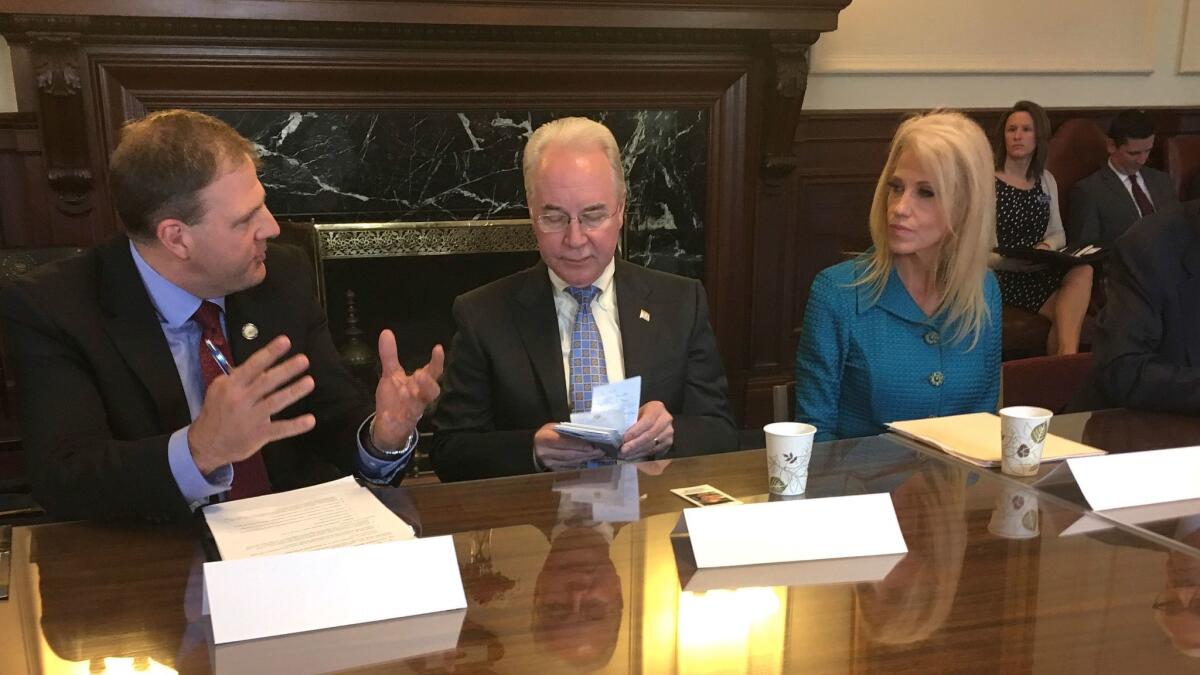Column: Trump’s rollback of birth control rights will run into a legal buzzsaw

The Trump administration’s long-telegraphed attack on women’s contraceptive rights acquired tangible form Wednesday with the leak to Vox of the text of the proposed rule change.
As expected, the Department of Health and Human Services, along with the departments of Labor and the Treasury, are planning to expand exemptions to the Affordable Care Act’s contraceptive care mandate so they apply to any employers expressing “religious beliefs and moral convictions” against birth control. The rule essentially would allow any employer to drop birth control coverage in employee health plans virtually at whim.
Aside from the retrograde nature of a rule targeting services for women, Nicholas Bagley of the University of Michigan Law School detects another big problem with the administration’s effort. The White House wants it to go into effect immediately with its publication in the Federal Register. That’s a violation of the law—specifically the Administrative Procedures Act, which requires that such rules be subject to notice and public comment before they’re adopted.
What’s the emergency here?....Where’s the fire?
— Nicholas Bagley, University of Michigan
“It’s a cumbersome process, often taking a year or more,” Bagley observes, “but it’s not optional.” That will make the rule change vulnerable to legal attack.
The administration tries to circumvent this process by arguing, first, that the administrative process can be avoided when notice and comment is “impracticable, unnecessary, or contrary to the public interest.” It also argues that the change is trivial, so it should be covered by the “millions of public comments” already submitted on the contraceptive mandate, “including the issue of whether to expand the exemptions.”
Bagley predicts that courts examining these excuses will say, “No dice.” The “impracticability” exemption typically applies when an emergency or court deadline requires a rule change. “What’s the emergency here?” Bagley asks. “Where’s the fire?”
Nor is the rule change “a minor tweak,” he says. The new rule would make three major changes in the ACA’s existing contraceptive mandate. It would expand the “accommodation” the Obama administration provided to religious organizations and private employers with religious scruples to any employers; it would accept undefined “moral” as well as religious objections; and it would allow employers to drop coverage without formally notifying the government, though employers subject to federal ERISA rules will have to disclose to employees that they’ve dropped birth control coverage.
“HHS may have received millions of comments about contraception,” Bagley writes, “but it hasn’t received focused feedback on these specific proposals. That’s likely to be a problem in court.”
As we’ve observed in the past, the ACA’s contraceptive mandate, which requires health plans to provide a full range of contraceptive measures without charging deductibles or co-pays, has been a flashpoint of objection to the law since its inception. Objectors scored a major win in 2014 with the Supreme Court’s Hobby Lobby decision, which granted an exemption to private companies whose owners expressed religious objections to contraception.
The Obama administration met that ruling and objections from religious employers by shifting responsibility for providing birth control from the employers to their insurance companies, with the cost to be covered by the government.
President Trump promised to roll back the rule even further, and cleared the way with an executive order last month allowing HHS and the other federal agencies to place “religious liberty” above the contraceptive mandate. HHS Secretary Tom Price, wearing his pastor’s hat rather than his healthcare regulator’s cap, promptly announced he “welcomes the opportunity to reexamine [the] contraception mandate.” The leaked regulation appears to be the product of his enthusiasm.
The regulatory proposal makes numerous largely unsupported assertions that the contraceptive mandate is no big deal. “The Departments have concluded that the governmental interest” in the mandate “is less significant than previously stated.” After all, it says, the “existing exemption for thousands of houses of worship” hasn’t harmed their employees, for the most part. Contraceptives are cheap, anyway, it says—most forms are available for “around $50 per month.”
And it wrings its hands over the conjecture that the contraceptive mandate might even “exacerbate the long run negative effect of changing sexual behavior by, for example, providing contraceptive access to teenagers and young adults who are not necessarily in the sexually active at-risk population of women.”
The departments claim that birth control access mandates “have not necessarily lowered rates of unintended pregnancy (or abortion) overall.” Their source for this vacuous assertion is a 2015 article in the Ave Maria Law Review of Florida’s Ave Maria University, which doesn’t strike one as an entirely secular publication. The article states bluntly that “programs designed to encourage or facilitate contraceptive use offer little, if any, public health benefit.”
Keep up to date with Michael Hiltzik. Follow @hiltzikm on Twitter, see his Facebook page, or email [email protected].
Return to Michael Hiltzik’s blog.
More to Read
Get the L.A. Times Politics newsletter
Deeply reported insights into legislation, politics and policy from Sacramento, Washington and beyond. In your inbox three times per week.
You may occasionally receive promotional content from the Los Angeles Times.











